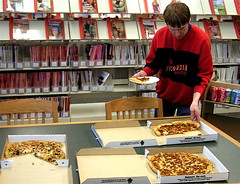I really enjoyed this keynote by author
Howard Rheingold, who wrote
Smart Mobs. The themes were of trust and communication over time. Rheingold noted that when he had written other books, he researched them, wrote them, and then put the topic away, but this topic has stuck with him. His presentation was lively, interesting and relevant, with visuals reminiscent of
Flat Stanley or
Where's Waldo. I've stuck pretty closely with my notes from his presentation:
Cell phones are changing the way the world looks at time, children, and each other. In Finland, the word for cell phone is the diminutive of “hand.” In Tokyo, people were walking around looking at their cell phones instead of around themselves or at each other. Rheingold heard the saying, “kids flock like birds” and noticed a softening of time, where we don't meet at a pre-specified time as much, but rather plan to meet in the afternoon and work out the details of when and where later, on the phone. Protests, meetings, etc., have all been arranged by cell phone (for example: "everyone show up at this time in this place wearing black"), lowering the threshold for cooperation. Oh My News (Korea) tipped the election on election day via social networking, and there are many more examples of this type of thing from all over the world: high school kids in Chile, Basques in Madrid, violent radicals in Denmark, Nigeria, Australia, and more.
This isn't new. Way back when, hunter-gatherers needed protein every day. They gathered together in extended family groups and managed to drive all large mammals in North America to extinction more quickly. These were big, so hunters could provide for more than themselves and their families. Communication was key for hunting and sharing.
Later, big civilizations grew in the river deltas. Writing began from record-keeping: accountants started it all! Reading and writing was limited to the elite until the printing press. New forms of collective action emerged from new forms of communication. Science becomes collective intelligence instead of personal genius. Luther wasn’t the first priest to protest, just the first to protest after printed broadsides. There were similar advances in politics with the founding of this country. There were huge advances in banking and commerce because people could transmit currency with paper – keys are trust and worldwide communication system. This sharing allowed people to build on each other’s discoveries. Looking forward, we are on another cusp with toward near universal use of small communication/computer devices.
Markets are changing. Open source is growing out of self-interest. Opening proprietary source software, letting people use it, has been key to development, growth, and financial rewards. For example, Lilly created a market for solutions, like eBay. Amazon, Google and others have opened up their programming interfaces and ads to let others make a little money and them make a lot of money. Getting people working on problems across firms and fields has been huge and successful. Prisoner’s dilemma stopped trading with unknowns, but eBay helped increase trust with seller information and power sellers. The internet is allowing us to communicate and share, which is allowing development that never could have happened otherwise, for example: Wikipedia, ThinkCycle (cooperative design for developing world), Swarm Supercomputing Collectives (SETI @ home, Folding @ home, and more), Amazon Mechanical Turk (crowd-sourcing), Cocreation of culture (p2p and many to many) blogs, YouTube, and more.
Success comes to those who provide powerful platforms that enable individuals. This is leveraged self-interest. It looks like altruism but enables their self-interest to help others.
We are in a multimedia world, with technology as mind amplifiers, used by people who never used to use computers. From small subcultures to large portions of population, people are, well, participating in participatory media…blogs, wikis, rss, mashups, podcasts, file sharing, tagging, and more. We have broader, faster, cheaper, social communication. We need to take risks with experimentation! Most learning is happening when the teacher isn’t looking, on evening and weekends, in the back of the class. Learning is self-guided, but needs more guidance from others, especially in how to apply skills. Librarians can help. There is a social media classroom available:
http://socialmediaclassroom.com, a combination blog, wiki, forums, chat, social bookmarking, how-to and more, which we can use to help people figure out what’s appropriate for their use, and the appropriate rhetoric to use there. This is currently available as a free Drupal download, but will soon be available in a hosted IT-Free version for educators, including libraries.
This is not all just fun. Social media can be used to make the world work better (when Rheingold couldn't get Comcast to respond to an emergency repair request, he got quick help by contacting Comcastcares on Twitter, and wikis and blogs have been effectively used to coordinate worldwide emergency response, as in
http://cooperationcommons.com). However, in this rapidly changing world, we need to keep up with the literacies, not the technologies. In searching: how do you get an answer, but also, how do you know the answers are true? This is key for librarians. We can help with the information literacy piece!
Labels: community relationships, conference, IL2008, librarianship, social networking, technology, trends, web 2.0


